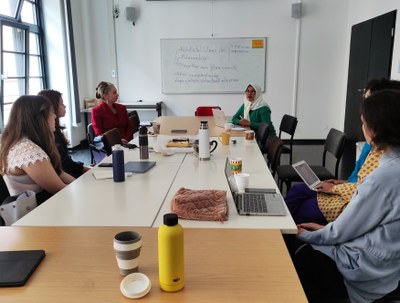Dr. Nor Ismah

Professionalization of women writers from the pesantren tradition in Indonesia
Pesantren is the oldest education system in Indonesia. They are boarding schools that offer a religiously oriented education. It has been established since 1742. The boarding schools are based on 5 main elements: Pondok (dorm), the Mosque, Santri (students), Kiai (readers), Kitab Kuning (the Book). For this paper, Nor interviewed 6 women writers from a new generation of writers (from 2000s on) who grew up with a Pesantren education. Due to this background, the women have the feeling they have to explain something about their authenticity. Through writing, these women target young girls and engage in da’wa. How do these women writers use their religious knowledge in order to professionalize their experience? How do they express their ideas and how does the new generation of women writers use new technology? For this, Nor focuses on two online book platforms: Kwikku and Komunitas. The aim of these websites is to establish a platform for Indonesian writers in their local language. One platform was founded by Asma Nadya, together with her husband. A few of the women writers engaged in these platforms are Khilma Anis, Mambaul Athiyah and Azri Zakkiyah.
Dr. Nor Ismah is a researcher and capacity-building consultant who is doing her PhD at Leiden University Institute for Area Studies (LIAS) the Netherlands sponsored by the Indonesia Endowment Fund for Education (LPDP) of the Ministry of Finance of Republic Indonesia (2016 -2020). She earned her master's degree from the University of Hawaii at Manoa USA in 2012. Ms. Ismah is experienced in designing modules and facilitating workshops, both online and offline, in the field of writing and research methods, gender and feminism, and peace education. She has been working for international and national NGOs such as Rahima, MSI-SIAP 1, AEPI-SSQ-Cardno, Search for Common Ground, Kemitraan, Mercy Corps, Koalisi Perempuan Indonesia, Perkumpulan Prakarsa, Abt Associates-KOMPAK, and Rahima. In her work, she applies qualitative and ethnographic methods and narrative writing in the field of social sciences and humanities with a specialization in gender, education, and media. She is familiar with approaches such as PRA (Participatory Rural Appraisal), Gender Mainstreaming (community and organizational level), Feminist Perspective, Intersectionality, Most Significant Changes, and Content Analysis.
Summary of Dr Ismah´s guest lecture
Most studies of fatwas and how they are produced in Indonesia focus on established fatwa institutions dominated by men. These studies are characterized by various approaches. They discuss, for example, methodological aspects, the meaning of maslaha (social good), religious authority, or the relationship between fatwas and the social context in which they emerge. In many cases, they are based on an Islamic studies framework, in which fatwas are primarily seen as documents resulting from either ijtihad or taqlid derived collective and institutional interpretations. Such studies tend to ignore the everyday practice of issuing fatwas at the grassroots, spaces that are often considered as being of marginal importance in fatwa-making, such as Islamic study groups or private spaces in which religious authorities and mustafti—the person requesting a fatwa—meet. In these cases, the religious authorities in question are often women.
Taking a different approach in comparison to most existing fatwa studies by employing a combination of anthropological and gender lens, I observed women issuing fatwas in Indonesia in different places and spheres of interaction between the fatwa-giver and fatwa asker. So instead of focusing on one or other established fatwa institution, in which women are usually underrepresented, I have examined the experience of women in Indonesia’s largest traditional mass Muslim organization, Nahdlatul Ulama (NU). I have focused on different sites of interaction: the organization itself, formal fatwa councils, the village/grassroots level, women’s activism, and women’s magazines. These different spaces of interaction demonstrate the dynamic changes between women’s experiences, women’s expression of religious authority, and everyday practices of issuing fatwas by women due to different kinds of capital and resources provided in those spaces.
Studying women issuing fatwas from an anthropological and gender perspective reveals fatwas with a variety of terms, meanings, and practices. Fatwa can be called ngendikan (Javanese: statement), dhebu (Madurese: statement), opinions, answers, and sikap dan pandangan keagamaan (religious attitudes and views). In this context, the essential part of a fatwa is how the Muslim believer finds it applicable and able to solve his or her religious problems. The fatwa can thus become a medium for ethical improvement and doctrinal change with interpretations that are more sensitive to gender justice. The practice of making fatwas by women shows fatwas as a disruptive practiceWhen these widespread fatwa-making practices are made visible, revealing women’s engagement, they can shift the entire discourse around the fatwa, derailing the idea of male domination. In addition, fatwas as a medium to demonstrate juristic authority not only occur in the context of religious institutions, but can also become part of the Islamic feminist movement. That has had two significant implications in the Third World women's movement, as explained by Mohanty (2003). First, it is breaking down the assumption of “Western eyes” on women from the Third World, and secondly it is proposing a grounded and distinctive framework that is rooted in the local context, which is Indonesian Islamic feminism.

